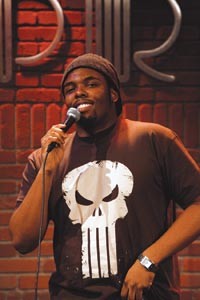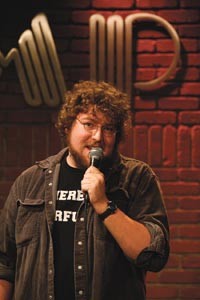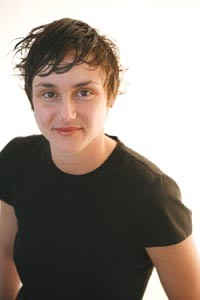The room has the feel of a college student's pad at precisely the moment a once-small house party explodes into a door-busting all-night rager. An industrial-sized sink overflows with ice and cans of Miller High Life, which people rip from the plastic rings and pass along to others in the buzzing crowd. Except this isn't someone's living room; it's a recording studio. And these aren't simply students looking for the nearest keg-stand. They're an audience.
On a rainy October night, this crowd has gathered at Lawrenceville's Blackberry Studios to create the real-life laugh track for local comedian Mo Mozuch, who is recording his first professional standup album, Blue Humor and Other Ruminations.
Some stand, milling around, while others wait on chairs, the piano bench and the floor. After warm-up sets from another standup comic and a guitar-strumming purveyor of collegiate comedy songs, the engineer hits "record" and Mozuch saunters up to the mic.
And things immediately get filthy.
"I lo-ve to fuck fat chicks," Mozuch announces, and the well-lubricated crowd lets out a half-horrified cheer. "Lemme clarify: I have learned to love to fuck fat chicks -- through a severe lack of options."
With a curly mop of sandy hair, a whispy beard and baggy clothes, the 24-year-old Mozuch gives the vague impression of slovenliness, except for his eyes, which dart around the room from behind wire glasses, gauging the response to each punchline. In his words, he looks "like Michael Moore." But he's also the winner of Esquire's "2007 Grooming Awards." "I got high and wrote the essay," he says later. "I made two or three Communist jokes in a 200-word essay about baby shampoo." (The prize was $500 worth of grooming products.)
Over the next half-hour, Mozuch hammers home a few key points: He's smart, funny, overweight and has a small penis -- and he wants the world to know. But just when you think it might sound a bit too Rodney Dangerfield, Mozuch leavens the material with a reference to Franz Kafka or Thomas Jefferson.
The crowd, meanwhile, is composed largely of current and former students at Duquesne University, where Mozuch also recently finished his master's degree in journalism, and where he was editor of the student newspaper, The Duke.
Although Duquesne probably wouldn't put them in a brochure, the local university has launched the careers of several Pittsburgh comedians, including Mozuch, Gab Bonesso, Jesse Joyce and newcomer T. Jones.
All four say that attending a private liberal-arts university has been helpful in developing material. But they've all faced spiraling tuition costs, which will have them paying off school loans for years. And of course their career choice can itself sound like the punch line to a joke about the kind of job you can get with a degree in, say, philosophy.
No wonder they grapple with this costly paradox by writing it into their routines.
Over kielbasa and Straub in the back room of Gooski's, Mozuch -- who describes himself as "fourth-generation Polish Hill" -- says he hopes the Blue Humor CD will help him get more bookings at colleges and clubs. "I invited all my friends and people I knew, bought the booze -- gave myself a stacked deck!" he says.
But the world may need to wait a bit for the final results, which he plans to release with cover art based on one of Picasso's "blue period" paintings ("a joke for me," he says). There's the money, for one thing. "Whenever I get the money together to print everything myself is when I'm gonna do it."
While Mozuch has a master's in journalism, he doesn't have a writing job. He's not even interested in one. "As far as being a general-assignment reporter, covering a beat, I don't have any aspirations to do that," he says. But he does hope his skills as a copy-editor and fact-checker will help support him when he moves to New York in a year or so. For now, he's working a couple of food-service jobs to make ends meet, when he's not doing standup gigs everywhere and anywhere he can.
Mozuch takes his act from hipster hangouts like Brillobox to the Waterfront's Improv club, as well as any little blue-collar bar with a mic. "There aren't a whole lot [of comedy nights] around Pittsburgh, so it's $20 here, $30 there," he says.
One of the rooms Mozuch has been working lately is the Shadow Lounge, an East Liberty music venue and hub for hip-hop culture, where he co-hosts a monthly comedy night with T. Jones, who's currently a junior at Duquesne, majoring in philosophy.
At age 21, Jones is slightly bemused by his job prospects in the real world. "I don't wanna have a philosophy major working at McDonald's, and be the smartest dude in the drive-thru, quoting Socrates," he jokes. "'The unexamined life is not worth living -- do you want fries with that?'"
But Jones seems to have a pretty good understanding of the networking and business sides of being a comedian in Pittsburgh -- he's working on his own CD/DVD, called Educated and Black, because "you gotta have something to sell after shows, you have to have that hustle." Even so, he says, "[I]t's just hard to get people to come out in Pittsburgh and support comedy."
Mozuch estimates the city's current roster of standup comics at around 50. And like any scene, Pittsburgh's local comedy scene has its different niches. Some comics work on material that appeals to a variety of audiences, hoping that will pay off in the long run with a national audience. Others go for easier hometown laughs by riffing on local idiosyncrasies, like Pittsburghese and Steelers jokes. And like any scene, comedians like to work with people they know. One pack of aspiring comics, including Mozuch and Jones, frequents the Improv; another works primarily at the Funny Bone in Station Square. Some, like Billy Elmer, who Mozuch describes as "The Godfather," tour regionally.
"And there's the so-called 'underground scene,'" says Mozuch. "Which is Gab."
That would be Gab Bonesso, who has sought to promote an alternative comedy scene in Pittsburgh since graduating from Duquesne in 2001 with a degree in theater.
"I'd say underground comedy is sort of what they tried to do with the original Saturday Night Live: changing comedy, doing it different," she says of the style she embraces. "It's going away from the normal style and being more alternative, or more edgy, or just anything that's not being done elsewhere."
With her cropped hair and hoodie, Bonesso looks more like an indie rocker than a nightclub comic. Her material, meanwhile, often promotes progressive gender politics: She recently concluded her opening set at Club Café by saying, "and yes, I have a vagina, and we'll be talking more about that later."
Bonesso, who grew up in Robinson Township, didn't start doing standup until after she graduated from Duquesne, signing up for a 2002 Funny Bone contest on a whim and writing the jokes on the way to the club. "Someone had told me they'd done the contest the week earlier, and they were like 'just talk about sex and drugs and you're golden,' so I wrote a bunch of blowjob jokes, like 'this will be hysterical!'" Apparently the audience thought so, too -- she made it to the finals. But her relationship with the mainstream club didn't last long.
More veteran comics, she said, told her, "'You're doing material about stuff nobody cares about. People don't care about gay rights, and you're doing abortion bits and that's just wrong.' And I was like 'OK, thanks for the tip, but I don't wanna do the PennDOT jokes.'"
Sitting at a table in the South Side's Starbucks -- "it's clean," says Bonesso, poking fun at her OCD tendencies -- she's pleased to have recently reopened another venue for underground comedy, Club Café. It was there that she hosted the Wednesday night Ha-Ha comedy series from 2003-2004, until a change in management ended the arrangement. Now, with another such change, she's back on the schedule, with some slight differences.
"In the old days, it was a free show, and we'd pass the hat," Bonesso says. "But now we have to charge $7 and you have to pay for the room, so it's kinda taken [the] underground feel out of it." Still, "we just desperately need an open-mic night that isn't at the Funny Bone. 'Cause there is nothing else out there."
Lately, she's also been hosting a night at Brillobox in Bloomfield, and doing one-offs like the 2005 New York City Underground Comedy festival, and benefits for Food Not Bombs, in Johnstown.
"It was just a bunch of high school kids, and they were all anti-war," Bonesso says of last year's event. "I did some of the edgiest stuff I've ever done for these kids, because I knew I could get away with it. They were all goth kids. ... I was like, 'Yeah, I know you guys are totally the kind of people who go kill your classmates, and sometimes they deserve it!' and they were like 'Yeah!' I can't do that at First Night."
While Bonesso featured Mozuch and Jones on her Brillobox showcases early on, the three have different tastes in comedy and different agendas -- even a bit of professional competitive tension. Differences aside, all three share the belief that Pittsburgh's limited outlets for comedy make it essential for them to eventually relocate to New York. And of course, a connection to their alma mater.
To a large extent, Bonesso praises the education she got at Duquesne. While the curriculum focused on the liberal arts, the students as a whole were fairly conservative -- and so in the classroom and outside of it, Bonesso was "challenged by belief systems different from my own" on a daily basis. Though she was raised Catholic, her family took a progressive attitude toward faith, and Bonesso says she didn't fully realize how progressive she was until she began attending school in "a very conservative setting."
Still, she says, in the long run attending Duquesne was a "huge mistake." She's still paying off her student loans, which are a major obstacle between her and the New York stages. "My parents didn't pay for [school] -- it was just bad decision-making on my part," she says.
With a year currently costing an average of $34,246 (which includes tuition, fees, room and board, and expenses), Duquesne's sticker price is average for private universities, but roughly triple what the Princeton Review says you can expect to pay at a public university.
Such costs, as much as any ideology, tend to make students at private schools "pragmatic," the word Frank Thornton uses to sum up Duquesne's ethos.
Thornton just retired this past September from the journalism and multimedia arts program after a 40-year career at Duquesne; he now lives in Murrysville. During the 1970s, he ran the school's theater program. He's also familiar with Mozuch ("a very bright kid") from his time as editor of The Duke, and was Bonesso's unofficial mentor.
"Duquesne has a system where you don't literally have a mentor," Thornton says. "But you kinda take someone under your wing or something, and pretty soon you wind up having them in a lot of your classes, and you give them more advice, and that's kind of where we were." He praises Bonesso's acting skills, her scrappy political stance, and frequently enjoyed the talk radio show on 93.7 The Zone produced by Bonesso featuring John McIntire (a CP columnist who frequently performs standup at the events Bonesso organizes). "Gabi and I probably share a political philosophy; I share it with McIntire, too," he says. "Frankly, I didn't know she was that good, until I heard [the show]."
You'd expect a person in Thornton's position to take some credit for those comedians making their way in the world -- to see their success as a result of opportunities he helped provide. But on one level, Thornton feels the exact opposite: If Mozuch and the others succeed, he says, "I think it's because there's a lack of opportunity to do really good things onstage" on campus.
Thornton has written a history of the embattled theater program, which has been passed around from department to department. While Duquesne's theater program has existed since 1889, "it has been like a foster child. ... [I]t just doesn't draw that much attention to itself.
"Duquesne is essentially a pragmatic, basically conservative school, I think in many respects, because it costs so much," Thornton says. "Which means you're going to have more Republicans' kids, and they're going to be thinking more in very pragmatic-slash-conservative ways. It's a good school of business, a great school of pharmacy, and a lot of those very nuts-and-bolts kind of majors."
This pragmatism, he says, fairly typical of costly private schools, is a reflection of "the times -- it's not necessarily the university."
During his four decades of teaching, Thornton says, people's attitudes toward education have become more mercenary: "Among the many American dreams is to put your kids through college, and put them through a good one ... because it's an investment like whatever you might buy on Wall Street." As a result, he sees the Duquesne students of today as "nice kids," most of whom tend to "come from a pampered environment, and they're expected to go back to that."
For the rest, what can you do in the face of a degree in, say, English, and a $30,000 debt except laugh? Fortunately, says Thornton, some of the things stressed in a liberal arts program -- like the insights into human nature offered by the lessons of literature, philosophy and history -- are the very elements that cause audiences to award high praise to a comedian's skill: "That is so true!"
"I'm almost medieval in my belief in the flexibility of a person who has a liberal arts degree," Thornton says. "You pull it out of your head -- or wherever. But if you don't have that kind of a breadth, you don't survive."
Which is perhaps all the more reason why Thornton's hat is off to people like Mozuch and Bonesso for facing crowds armed only with a microphone and their wits -- something he says, "I wouldn't have the stones to do."
Attending Duquesne, says Bonesso, "both helped and hurt." But one thing's certain, she says: "Going through that helps you foster material."
Behind the stage in the large ballroom in Duquesne's student union is a floor-to-ceiling cross made of stained glass. About half the seats arranged before it are filled with politely attentive students, including one sporting a hoodie with the slogan: "She's a child -- not a choice." But flanking the stage are unlit tiki torches and garish clusters of balloons intended to represent palm trees, part of the evening's theme, "A Night in the Tropics." And while nothing says "tropics" like Uptown in late February, Jesse Joyce is using his nervy, clipped delivery to turn up the heat.
The lanky 29-year-old peers out at the assembled students with his enormous eyes -- his "squirrelly coke eyes," as he calls them -- and tells a joke about falling for his nurse while hospitalized.
"I've got some advice for any single guys who might be in the room. For whatever reason, if you have to go in for surgery, they tend to put a lot of hot chicks involved with the surgery process. There's always hot surgical interns running around getting you water and making sure you pee. And you're gonna try to hit on them ... and that's not gonna work at all. Because you're lying half-naked on a table with a paper napkin over your dick. ... I don't even know what I was thinking, like 'Maybe they'll write their number on my dick napkin!'"
As the students applaud, Joyce gestures to a man in the front row. "And yes, I just said 'dick napkin' in front of a priest I know."
Joyce, who's sporting his Duquesne class ring, is performing at his alma mater for the first time since he graduated in 2000 with a degree in art history. When he left for New York City after college, he vowed not to return to the school's stage until he'd made a name for himself. Tonight, he seems a bit nonplussed at the initially thin crowd, but perhaps he's just chafing a bit from the "PG-13" rating the student organizer has asked him to observe. It's an odd request, perhaps, since the audience is made up of college students who can see R-rated movies without adult supervision. But Joyce agrees to tone down the language a bit; there are some "really great blowjob jokes" he's had to cut, he says later.
But he's still enjoying the victory lap -- and well he should. He's already done what Mozuch and Bonesso hope to do: He's honed his skills in New York's numerous standup clubs, where "you're playing with guys who are better than you."
Joyce has earned numerous radio and television credits, including Comedy Central's Live at Gotham series, and was a contributing writer for the station's Flavor Flav roast. He's toured clubs, military bases and college campuses nationwide; last year, he toured Iraq, Kuwait, Saudi Arabia, Qatar and more with a group called "Comics on Duty."
While Joyce had been interested in comedy from an early age, it wasn't until 1998 that he first performed, opening for his friends in local modern-rock band Mercury. The arrangement allowed him to do half-hour sets -- an unheard-of luxury for new comedians. From there, he did as many on-campus events as he could, sometimes opening for touring comics on the same stage he's now headlining. "I just started making my own opportunities," he says. But he knew there was something larger waiting out there for him.
"I knew the Funny Bone existed, but I wasn't old enough," he says. But as soon as he could, Joyce took a job as a bar-back at the club, taking the stage at open mics and to fill time when a headliner was running late.
It's been a hard-won success in many ways. When he got to New York, "I was broke -- a broke fucking shitty waiter at Planet Hollywood." While he's proud to have paid off his debts two years ago, by doing comedy, and especially the occasional corporate gig, he remembers the times when Visa called him every day.
And on stage, he uses such memories as the basis for material college students can relate to. Some of his biggest laughs, in fact, come from his digs at the cost of a Duquesne education.
"They told me how much it costs to go here now -- holy shit!" he exclaims. "It was $20,000 a year" when he attended. "I don't know $80,000 worth of shit.
"I was trying to figure out what they were spending my money on. I found out in my senior year of college, they spent $180,000 on a salad bar. It's really nice ... but it just has salad. For 180 grand, you can buy a really nice house, and just fill it with lettuce. For $180,000, you can buy five Filipino boys and a Salad Shooter."
After the show, Joyce hawks his CDs and signs autographs, then makes his way to a dressing room at the top floor of the union, stepping outside onto a balcony that looks out over the campus. In between pulls on his Marlboro Light, he reflects on how his Duquesne education prepared him for a comedy career.
"You have to be kind of an arrogant person to do this," he says, and Duquesne students, self-selected by the cost of a private education, "are a bunch of little go-getters." His own drive is in part a legacy from his parents, two Duquesne grads who as students helped raise money that essentially saved the school from going under in the early 1970s.
"I grew up knowing all my life that I could do whatever I wanted to, if I worked hard," Joyce says.
The prospect of earning an art history degree, then heading off to a comedy career doesn't appear an insurmountable obstacle to him, or even odd. "I wouldn't have changed anything."
But Joyce has the benefit of hindsight. The long-term value of a liberal arts education can be less apparent to an aspiring comedian who's still in the middle of it -- even for a go-getter like Duquesne junior T. Jones.
Onstage at the Improv, Jones grasps the mic and knocks the end of it repeatedly against his forehead, using the obvious phallus to obscenely mime just exactly what he thinks Duquesne's high tuition should entitle him to do to a professor. Although he's at the Waterfront instead of the student union, his digs at Duquesne are good for plenty of laughs -- the university is just a lens to explore what's funny about colleges in general.
"I was lied to my whole life about college, told they breed the best kind of people, like doctors, lawyers," he says from the stage. "But there's really only four categories you can be: in-telligent, in debt, alcoholic or a whore."
The Penn Hills native originally attended Alabama A&M, but when a knee injury ended his football career there, he decided to move back and get a philosophy degree from Duquesne. But that was before his comedy act began to take off. Now Jones wants to switch to communications, which he thinks might be more helpful for his comedy career. But he isn't sure he'll attend a private university to do it.
"You can't major in standup in college," he says. "You can't teach it. You have to pay your dues, work your way up, then boom -- then one day you'll make it. If you work hard enough."
Still, standup comedy may be one of the paying gigs you can get with a philosophy degree. "I wanna be able to click in there and bring the truth out, the reality, and make people laugh with philosophy," says Jones. "Every time that bit's really killing and they're clapping, there's some truth in there."
It's a truth that can resonate even with Duquesne's employees. As Jones recounts with pride, after opening for a headliner at the Improv, "this dude comes up to me like, 'I'm a professor at Duquesne, man! Dude, that was funny!'"






















